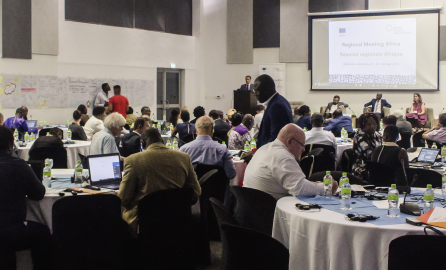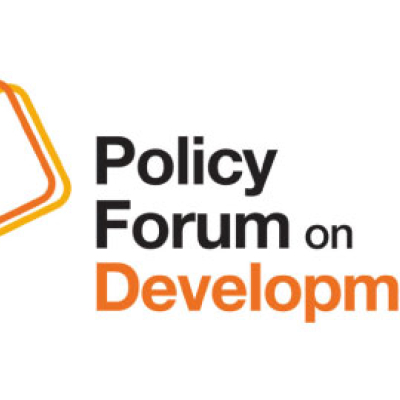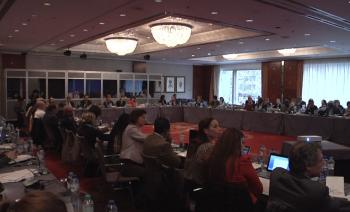Between 8 and 10 October 2018, representatives of civil society organisations, the private sector and local authorities from across Africa gathered in Gaborone for the third Regional Meeting Africa of the Policy Forum on Development (PFD).
“I’m very happy that the Policy Forum on Development happened here,” said Jan Sadek, the newly-appointed EU Ambassador to Botswana. “The PFD is about creating a platform for dialogue between the European Union, civil society and local authorities – this dialogue is of the greatest importance. We need to ensure we’re on the same line when it comes to development so that it doesn’t become an elitist approach but reaches the grassroot levels.”
A strategic location
Supported by the European Commission, the PFD is a multi-stakeholder platform that meets at global and regional levels to discuss the most pertinent development issues. This year’s edition of the Africa PFD focused on the recommendations that came out of last year’s African Union - EU Summit and the vision for the proposed post-2020 African Union - EU framework. It also examined the African Union theme of the year of combatting corruption.
“We need to ensure we’re on the same line when it comes to development so that it doesn’t become an elitist approach”
"Botswana is taking issues relating to corruption very seriously – it is very important we find ways of discouraging it, so that the resources that would go to our development programmes are secure enough so we get their full value,” said Sylvia Tabitha Muzila, mayor of Francistown and vice-president of the Botswana Association of Local Authorities (BALA), who spoke on a panel on tackling corruption.
Botswana boasts the lowest perceived level of corruption in Africa according to Transparency International’s Corruption Perceptions Index. For Muzila, a big part of this achievement can be attributed to the establishment of a Directorate on Corruption and anti-corruption committees within the government ministries.
|
Capacity4dev interviewed several of this year’s participants over the three days of the conference. Keep checking the Voices & Views section for our videos and articles offering more in-depth coverage of the issues raised. The full outcomes of the PFD are viewable here. |
Continued engagement
Among the recommendations that came from this year’s Africa PFD was the reiteration that future AU-EU partnerships should embrace a multi-stakeholder approach that ensures the voice, contribution and priorities of actors such as civil society and local authorities.
Mugalla moderated a working group on trade and development that looked at the coherence of trade agreements – most notably, the Economic Partnership Agreement. The agreement, signed in 2016 between the EU and members of the Southern African Development Community, looks to increase trade relations between the two blocs.
“We want to ensure that development is people-centred and that's the reason we're here”
"We fight for workers’ rights. We want to ensure that development is people-centred and that's the reason we're here,” said Caroline Khamati Mugalla, Executive Secretary of the East African Trade Union Confederation (EATUC).
For Mugalla, the variety of stakeholders that the PFD brought to the table offered an opportunity to both provide input and bridge some of the fragmentation she sees present in civil society in Africa. Opening consultations around trade to stakeholders – from women’s and youth groups to trade unions and local government – is a way of ensuring that the benefits of international cooperation are felt by the average citizen, Mugalla said.
For more information on the Policy Forum on Development, visit the platform’s group on Capacity4dev.




Log in with your EU Login account to post or comment on the platform.